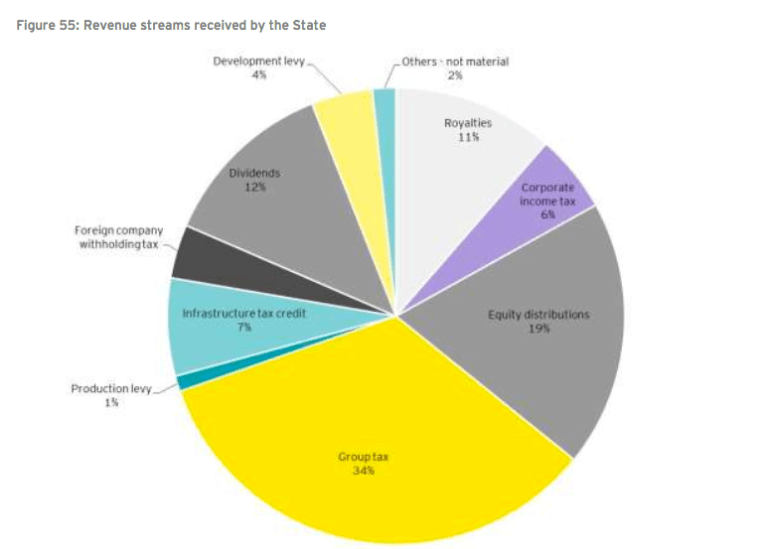Sources of revenue from extractive sector to government. Source: EITI
![]()
The 2016 Papua New Guinea Extractive Industries Transparency Initiative report has found that improvements are being made to registry and payment systems in Papua New Guinea, but more needs to be done. It notes that budgeting for government revenues remains difficult because of the resources industry’s volatility, and the relatively small number of companies paying full tax.
The EITI report, which is produced by Ernst & Young, says that ‘in some cases, the absence of a robust system for managing government revenue payments in PNG leaves the system vulnerable to fraud, corruption, and human error.’
It found that the problem of transparency is amplified when payments to sub-national [provincial and district] governments are taken into consideration, noting that the Asian Development Bank has called for greater transparency in sub-national government resource revenue flows.
Budgeting
Budgeting for government revenues, the report says, from the extractive sector is ‘complex due to the revenue being subject to fluctuations in quantities produced and global commodity prices’.
‘Medium-term projections anticipate that corporate income tax (mining and petroleum tax) will come mainly from Ok Tedi, Porgera and the oil fields.’
A further issue is the high number of extractive companies that have some form of tax exemption.
‘Medium-term projections anticipate that corporate income tax (mining and petroleum tax) will come mainly from Ok Tedi, Porgera and the oil fields.
‘The Ramu Nico mine has a 10-year exemption from corporate income tax. The Lihir mine continues to undertake high capital expenditures which reduce its taxable income.
‘Low LNG prices, together with an accelerated depreciation allowance, means there may not be corporate income tax from the PNG LNG project.
‘In addition, key mines are claiming Infrastructure Tax Credits (ITCs).’

PNG oil and gas production. Source: EITI
Recommendations
The EITI report makes a number of recommendations. One was the implementation of a reliable electronic registry system to supersede the current paper ledger system.
The report noted that scanning of all documents has begun, but it will require additional resources to adhere to the EITI Standard.
‘There has been better information on payments and receipts, especially from the MRDC.’
‘The Department of Petroleum and Energy will need to provide information regarding licences awarded and transferred in previous reporting periods.’
Another recommendation has been that the Mineral Resources Development Company (MRDC) reports on the equity distribution and all other funds it holds in trust and invests for the landowners and for future generations.
It notes that there has been better information on payments and receipts, especially from the MRDC.
Making electronic payments, rather than using cash or cheques, is identified as a priority. The lack of a ‘robust system for managing resource payments leaves the system vulnerable to fraud, corruption and human error,’ the report says.
‘The medium-term economic outlook for PNG remains positive, with foreign investments in the pipeline’.
‘There were specific financial instructions from the Finance Minister for government agencies to heed this change and transition into electronic payments system where possible.’
Two other areas of focus are improving reporting on sub-national payments and ensuring that Memorandums of Understanding (MOAs) are made public.
Positive prospects
The EITI report says the medium-term economic outlook for PNG ‘remains positive, with foreign investments in the pipeline’.
It anticipates 2.8 per cent GDP growth in 2018, pointing to:
- A gradual pick-up in the global economy, which is expected to boost commodity prices and stimulate activity in sectors outside resource extraction.
- Increased output in mining.
- Forecast growth in agriculture, forestry and fishery output of 3 per cent, with increases in both price and production.
- PNG’s hosting of the Asia-Pacific Economic Cooperation Leaders’ Meeting in 2018.
- Legislative changes introduced on 1 January 2017 on taxation of the extractive sector.
Copyright © 2018 Business Advantage International.


